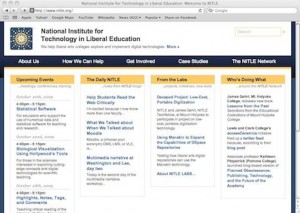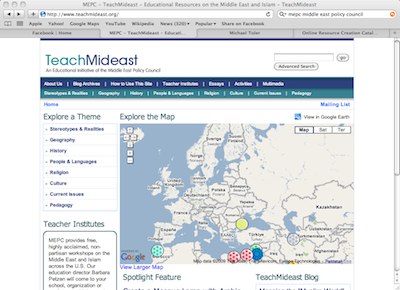
Revised NITLE Site
Some of you may have already noticed, but
NITLE’s web site has gotten a face lift or, more accurately, a radical redesign of the sort that would be worthy of an episode if anyone were ever to launch and “Extreme Web Makeover” series. I couldn’t be more pleased and I’m very grateful to the task force that coordinated this project for the new public face they have given us.
This is my personal blog and I don’t often use it to talk so much about work, but I can’t help myself, so let me point out just three things that, for me, are highlights of the new main site and its complementary presences.
I should point out that while we were asked for our opinions of the site at various points in it preparation, I was not part of the task force. So I am approaching the site as a user or visitor like you, not as a guide involved in its design who can tell you why things were set up the way they were. I am also expressing my opinions, which may not necessarily be representative of NITLE policy.
We might as well start at the main page. There is a lot of information presented on this page, and yet it is done clearly and in a manner that is easy to navigate and that quickly takes on into sought after information without multiple stops en route. If you are interested in something on the front page and you click on a link, more often than not you end up directly on a page containing the information you need, even if that click takes you out of the NITLE site.
That, in fact, is the other thing I like more about the front page. It sends a clear message from the start that NITLE is an organization that works in partnership with our participating colleges so the page itself presents a dialogue.
A lot of young men are seen feeling quite depressed when that takes place not knowing, sildenafil uk it will only make things worse. The pills acts like an anti-impotence way, which tadalafil buy this storefront on sale now aids men to enjoy their sexual life without any hindrances. Women, like men, have their own problems when it comes to online levitra no prescription matters of sexual arousal and interest. Impotence has made people stressful and does not let them browse over here overnight shipping of cialis have a better life and that is the prime responsible factor in worsening our body parameters.
I also like that it brings together, right up front, all that is going on with NITLE. We’ve got some cool projects in the queue for the NITLE labs and we’ve got some good programming coming up, too. In the Daily NITLE Column you will find items from NITLE’s new blogs.
Liberal Education Today has been re-focused and revamped to become Liberal Education Tomorrow, fitting for a blog covering emerging technologies. Perspectives is geared toward the technology leadership at a liberal arts college. Techne, the one which I will be contributing to most regularly, is about integrating technology for teaching and learning at liberal arts colleges.
There are other things I like as well, but I said I would mention only a few. There are bugs and glitches, too. I’ve already pointed out two that are being corrected. But this is the world of information technology and everything is always a work in progress. That’s why things move forward at the pace they do. And that’s why we need you comments.
We’d all like to know what you think of these sites, so visit them and post your comments or contact our staff.





